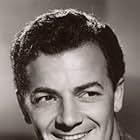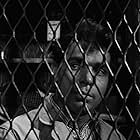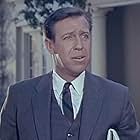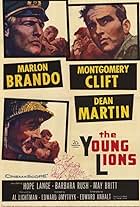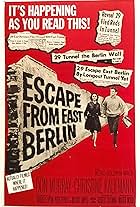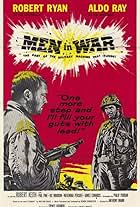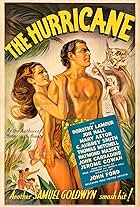IMDb RATING
6.2/10
1.8K
YOUR RATING
As a US marine unit fight against the defenders of a Japanese held island, both sides are haunted by their own thoughts and memories.As a US marine unit fight against the defenders of a Japanese held island, both sides are haunted by their own thoughts and memories.As a US marine unit fight against the defenders of a Japanese held island, both sides are haunted by their own thoughts and memories.
- Nominated for 1 Oscar
- 2 nominations total
Jaime Sánchez
- Colombo
- (as Jaime Sanchez)
Storyline
Did you know
- TriviaThe sequence in which Japanese troops tried to fool the US Marines by wearing their uniforms was taken directly from the source novel. It includes a passage where the Japanese wore American helmets while attempting to penetrate the Marine positions in order to make them think they were fellow Marines.
- GoofsThe American tanks are portrayed by M41 Walker Bulldogs, which were not developed until after the war.
- Quotes
Sergeant Honeywell: That's what we're here for. To kill. The rest is all crap!
- ConnectionsReferenced in Conker: Live and Reloaded (2005)
Featured review
A fair screen performer, Cornel Wilde occasionally appeared in more interesting fare, such as the cult B-noir The Big Combo (1955), a title held today in greater esteem these days than his other mainstream successes. Of greater interest still is Wilde's career as a director that, with the tense drama of Storm Fear, started the same year as Combo. Although not a fully mature work, it still suggested some of the themes that would inform Wilde's later films: a concern with man confronting the elemental, whether externally or internally, and a fondness for extreme situations.
From the mid 1960s onwards Wilde made a remarkable trilogy of work in quick succession: The Naked Prey (1966), Beach Red, and No Blade Of Grass (1970), which are the films upon which his directorial reputation rests principally today. Each concerns a journey of one sort or another, in which men must differently face up to the primitive impulse within themselves as the comforting supports of civilised society stripped away. Thus in The Naked Prey a European is pursued by relentless natives across a bleak African wilderness. In No Blade Of Grass a party of English refugees and survivors have to navigate a post-catastrophe landscape. Beach Red sees soldiers face up to their innermost fears and regrets during the bloody battle for a Pacific island. Typically in Wilde's work, a stricken or unforgiving world reflects back the straits in which the main characters find themselves whilst any final resolution is, at best, ambivalent. In Beach Red this environment is lush and dangerous, full of both natural and human perils (at one point the director gives a litany of killer flora and fauna), but one where the greatest threat to man is Man himself.
Some critics have compared Wilde's cinema to that of Sam Fuller. Both forge personal cinema with an own, urgent vision. Fuller is the more assured stylist, with his tabloid-inspired contemplation of events. Wilde, too, often wears his message unashamedly on his sleeve - most obviously in the weaker No Blade Of Grass, or in some of the regretful soliloquizing of Beach Red. Like Fuller, Wilde produced and directed, but also scored and acted in two out three of his best works. (He's also heard as the narrator in the present film, and performs a similar function as a radio voice in No Blade Of Grass). Beach Red was the only one he also co-wrote, which leads one to think it had particular interest for the director. Unlike Fuller, Wilde never served in the armed forces. And unlike Fuller's war movies, Wilde's single martial opus is distinguished by its even-handedness. While the gritty realism and hard-wrought bravery of Wilde's soldiery is never in doubt the same, just, eye is applied to both sides.
The humans in uniform place the blame for the ensuing cruelty and pain not, as a rule, on individuals but on a wider commitment to duty, outside of any immediate questioning. When a soldier is guilty of any unnecessary cruelty, such as the Sergeant who breaks both the arms of a dangerous Japanese prisoner to subdue him, Captain MacDonald condemns the action outright. "We must never forget why we are killing...". In all of his major films Wilde's world is often cruel and hard - but never sadistic, his main characters determined, never cynical. MacDonald, John Custance, or the unnamed runner of The Naked Prey, do not manipulate others, but only try and survive, making the best of a bad world. (A difference in worldview that explains why Fuller made a string of excellent noir films while Wilde only made one.)
Those who have seen Saving Private Ryan will feel right at home here, and not just with the painful introspection of MacDonald as he struggles with duty. (Others have felt the flashbacks and narration anticipate Malick's The Thin Red Line, 1998.) Here, too, we see men dying in the water during a beach landing, pinned down beneath murderous machine gunfire, eviscerated, half burnt by flame throwers. Limb parts float in the water, while the young warrior 'Mouse' stands in horror, his arm ripped from his side. It's no romanticised version of war and the ending of Beach Red is less compromising than Spielberg's that, catering to different tastes, felt compelled to offer. More than in No Blade Of Grass, Wilde feels free to indulge in stylistic tricks and methods to achieve the peculiar dream-like intensity which accompanies combat experience, using stills, visual distortions, voiceovers and flashbacks. These highlight the interior life of his characters, some of these 'internalised' moments being almost as explicit and powerful as dynamic scenes elsewhere, such as during one of MacDonald's sensual reveries about his wife, when we see her presumably on the point of orgasm. There's sexual content too in the conversations between Private Egan (Burr de Benning) and minister's son Private Cliff (Patrick Wolfe), including at one point fantasising over a woman's torso fashioned from coconut shells and soil.
Memories of sensuality provides nostalgia for the soldiers. But Beach Red offers no real solutions to the horrors of war, and is unflinching. If MacDonald's supporting narration during combat is sometimes a little too matter of fact then this can be ascribed to Wilde's naiveté, in the best sense, as a director, an ongoing quality marking his best work. MacDonald, a lawyer by profession, is just a man who wants to get back to his wife. John Custance just wants to reach his brother's refuge in Scotland. 'The Man' in The Naked Prey just wants to elude his dogged pursuers. Characters are boiled down to essentials through their desires, offering a simple focus on key, almost primitive, issues in times of great adversity. When necessary, then narrator Wilde can provide the hand-on-heart commentary. This honesty means that we can overlook the odd cliché in his Beach Red, and enjoy it as one of the best war films.
From the mid 1960s onwards Wilde made a remarkable trilogy of work in quick succession: The Naked Prey (1966), Beach Red, and No Blade Of Grass (1970), which are the films upon which his directorial reputation rests principally today. Each concerns a journey of one sort or another, in which men must differently face up to the primitive impulse within themselves as the comforting supports of civilised society stripped away. Thus in The Naked Prey a European is pursued by relentless natives across a bleak African wilderness. In No Blade Of Grass a party of English refugees and survivors have to navigate a post-catastrophe landscape. Beach Red sees soldiers face up to their innermost fears and regrets during the bloody battle for a Pacific island. Typically in Wilde's work, a stricken or unforgiving world reflects back the straits in which the main characters find themselves whilst any final resolution is, at best, ambivalent. In Beach Red this environment is lush and dangerous, full of both natural and human perils (at one point the director gives a litany of killer flora and fauna), but one where the greatest threat to man is Man himself.
Some critics have compared Wilde's cinema to that of Sam Fuller. Both forge personal cinema with an own, urgent vision. Fuller is the more assured stylist, with his tabloid-inspired contemplation of events. Wilde, too, often wears his message unashamedly on his sleeve - most obviously in the weaker No Blade Of Grass, or in some of the regretful soliloquizing of Beach Red. Like Fuller, Wilde produced and directed, but also scored and acted in two out three of his best works. (He's also heard as the narrator in the present film, and performs a similar function as a radio voice in No Blade Of Grass). Beach Red was the only one he also co-wrote, which leads one to think it had particular interest for the director. Unlike Fuller, Wilde never served in the armed forces. And unlike Fuller's war movies, Wilde's single martial opus is distinguished by its even-handedness. While the gritty realism and hard-wrought bravery of Wilde's soldiery is never in doubt the same, just, eye is applied to both sides.
The humans in uniform place the blame for the ensuing cruelty and pain not, as a rule, on individuals but on a wider commitment to duty, outside of any immediate questioning. When a soldier is guilty of any unnecessary cruelty, such as the Sergeant who breaks both the arms of a dangerous Japanese prisoner to subdue him, Captain MacDonald condemns the action outright. "We must never forget why we are killing...". In all of his major films Wilde's world is often cruel and hard - but never sadistic, his main characters determined, never cynical. MacDonald, John Custance, or the unnamed runner of The Naked Prey, do not manipulate others, but only try and survive, making the best of a bad world. (A difference in worldview that explains why Fuller made a string of excellent noir films while Wilde only made one.)
Those who have seen Saving Private Ryan will feel right at home here, and not just with the painful introspection of MacDonald as he struggles with duty. (Others have felt the flashbacks and narration anticipate Malick's The Thin Red Line, 1998.) Here, too, we see men dying in the water during a beach landing, pinned down beneath murderous machine gunfire, eviscerated, half burnt by flame throwers. Limb parts float in the water, while the young warrior 'Mouse' stands in horror, his arm ripped from his side. It's no romanticised version of war and the ending of Beach Red is less compromising than Spielberg's that, catering to different tastes, felt compelled to offer. More than in No Blade Of Grass, Wilde feels free to indulge in stylistic tricks and methods to achieve the peculiar dream-like intensity which accompanies combat experience, using stills, visual distortions, voiceovers and flashbacks. These highlight the interior life of his characters, some of these 'internalised' moments being almost as explicit and powerful as dynamic scenes elsewhere, such as during one of MacDonald's sensual reveries about his wife, when we see her presumably on the point of orgasm. There's sexual content too in the conversations between Private Egan (Burr de Benning) and minister's son Private Cliff (Patrick Wolfe), including at one point fantasising over a woman's torso fashioned from coconut shells and soil.
Memories of sensuality provides nostalgia for the soldiers. But Beach Red offers no real solutions to the horrors of war, and is unflinching. If MacDonald's supporting narration during combat is sometimes a little too matter of fact then this can be ascribed to Wilde's naiveté, in the best sense, as a director, an ongoing quality marking his best work. MacDonald, a lawyer by profession, is just a man who wants to get back to his wife. John Custance just wants to reach his brother's refuge in Scotland. 'The Man' in The Naked Prey just wants to elude his dogged pursuers. Characters are boiled down to essentials through their desires, offering a simple focus on key, almost primitive, issues in times of great adversity. When necessary, then narrator Wilde can provide the hand-on-heart commentary. This honesty means that we can overlook the odd cliché in his Beach Red, and enjoy it as one of the best war films.
- FilmFlaneur
- Sep 2, 2005
- Permalink
- How long is Beach Red?Powered by Alexa
Details
Box office
- Budget
- $1,800,000 (estimated)
Contribute to this page
Suggest an edit or add missing content








